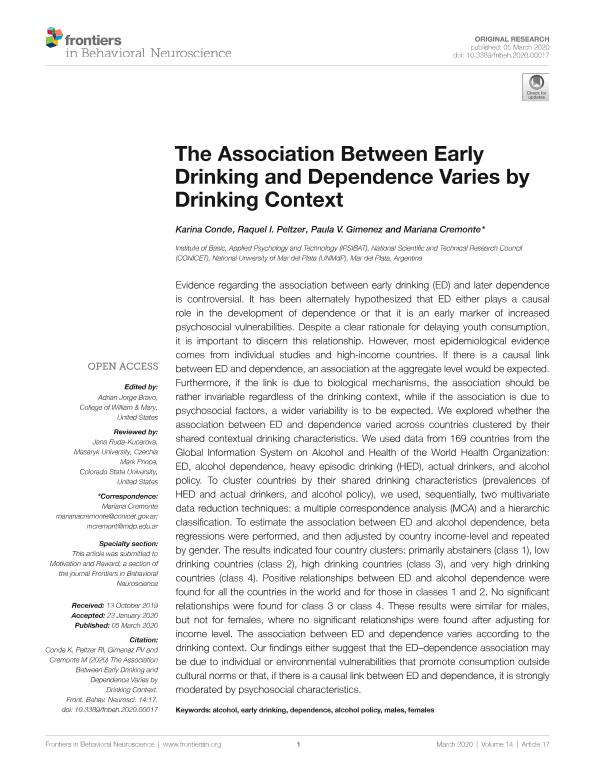Mostrar el registro sencillo del ítem
dc.contributor.author
Conde, Karina Natalia

dc.contributor.author
Peltzer, Raquel Inés

dc.contributor.author
Gimenez, Paula Victoria

dc.contributor.author
Cremonte, Mariana

dc.date.available
2021-10-07T15:32:39Z
dc.date.issued
2020-03
dc.identifier.citation
Conde, Karina Natalia; Peltzer, Raquel Inés; Gimenez, Paula Victoria; Cremonte, Mariana; The Association Between Early Drinking and Dependence Varies by Drinking Context; Frontiers Media; Frontiers in Behavioral Neuroscience; 14; 3-2020; 1-7
dc.identifier.issn
1662-5153
dc.identifier.uri
http://hdl.handle.net/11336/143138
dc.description.abstract
Evidence regarding the association between early drinking (ED) and later dependence is controversial. It has been alternately hypothesized that ED either plays a causal role in the development of dependence or that it is an early marker of increased psychosocial vulnerabilities. Despite a clear rationale for delaying youth consumption, it is important to discern this relationship. However, most epidemiological evidence comes from individual studies and high-income countries. If there is a causal link between ED and dependence, an association at the aggregate level would be expected. Furthermore, if the link is due to biological mechanisms, the association should be rather invariable regardless of the drinking context, while if the association is due to psychosocial factors, a wider variability is to be expected. We explored whether the association between ED and dependence varied across countries clustered by their shared contextual drinking characteristics. We used data from 169 countries from the Global Information System on Alcohol and Health of the World Health Organization: ED, alcohol dependence, heavy episodic drinking (HED), actual drinkers, and alcohol policy. To cluster countries by their shared drinking characteristics (prevalences of HED and actual drinkers, and alcohol policy), we used, sequentially, two multivariate data reduction techniques: a multiple correspondence analysis (MCA) and a hierarchic classification. To estimate the association between ED and alcohol dependence, beta regressions were performed, and then adjusted by country income-level and repeated by gender. The results indicated four country clusters: primarily abstainers (class 1), low drinking countries (class 2), high drinking countries (class 3), and very high drinking countries (class 4). Positive relationships between ED and alcohol dependence were found for all the countries in the world and for those in classes 1 and 2. No significant relationships were found for class 3 or class 4. These results were similar for males, but not for females, where no significant relationships were found after adjusting for income level. The association between ED and dependence varies according to the drinking context. Our findings either suggest that the ED–dependence association may be due to individual or environmental vulnerabilities that promote consumption outside cultural norms or that, if there is a causal link between ED and dependence, it is strongly moderated by psychosocial characteristics.
dc.format
application/pdf
dc.language.iso
eng
dc.publisher
Frontiers Media

dc.rights
info:eu-repo/semantics/openAccess
dc.rights.uri
https://creativecommons.org/licenses/by-nc-sa/2.5/ar/
dc.subject
ALCOHOL
dc.subject
ALCOHOL POLICY
dc.subject
DEPENDENCE
dc.subject
EARLY DRINKING
dc.subject
FEMALES
dc.subject
MALES
dc.subject.classification
Otras Psicología

dc.subject.classification
Psicología

dc.subject.classification
CIENCIAS SOCIALES

dc.title
The Association Between Early Drinking and Dependence Varies by Drinking Context
dc.type
info:eu-repo/semantics/article
dc.type
info:ar-repo/semantics/artículo
dc.type
info:eu-repo/semantics/publishedVersion
dc.date.updated
2021-09-06T18:25:48Z
dc.journal.volume
14
dc.journal.pagination
1-7
dc.journal.pais
Suiza

dc.description.fil
Fil: Conde, Karina Natalia. Consejo Nacional de Investigaciones Científicas y Técnicas. Centro Científico Tecnológico Conicet - Mar del Plata. Instituto de Psicología Básica, Aplicada y Tecnología. Universidad Nacional de Mar del Plata. Facultad de Psicología. Instituto de Psicología Básica, Aplicada y Tecnología.; Argentina
dc.description.fil
Fil: Peltzer, Raquel Inés. Consejo Nacional de Investigaciones Científicas y Técnicas. Centro Científico Tecnológico Conicet - Mar del Plata. Instituto de Psicología Básica, Aplicada y Tecnología. Universidad Nacional de Mar del Plata. Facultad de Psicología. Instituto de Psicología Básica, Aplicada y Tecnología.; Argentina
dc.description.fil
Fil: Gimenez, Paula Victoria. Consejo Nacional de Investigaciones Científicas y Técnicas. Centro Científico Tecnológico Conicet - Mar del Plata. Instituto de Psicología Básica, Aplicada y Tecnología. Universidad Nacional de Mar del Plata. Facultad de Psicología. Instituto de Psicología Básica, Aplicada y Tecnología.; Argentina
dc.description.fil
Fil: Cremonte, Mariana. Consejo Nacional de Investigaciones Científicas y Técnicas. Centro Científico Tecnológico Conicet - Mar del Plata. Instituto de Psicología Básica, Aplicada y Tecnología. Universidad Nacional de Mar del Plata. Facultad de Psicología. Instituto de Psicología Básica, Aplicada y Tecnología.; Argentina
dc.journal.title
Frontiers in Behavioral Neuroscience
dc.relation.alternativeid
info:eu-repo/semantics/altIdentifier/url/https://www.frontiersin.org/article/10.3389/fnbeh.2020.00017/full
dc.relation.alternativeid
info:eu-repo/semantics/altIdentifier/doi/https://doi.org/10.3389/fnbeh.2020.00017
Archivos asociados
